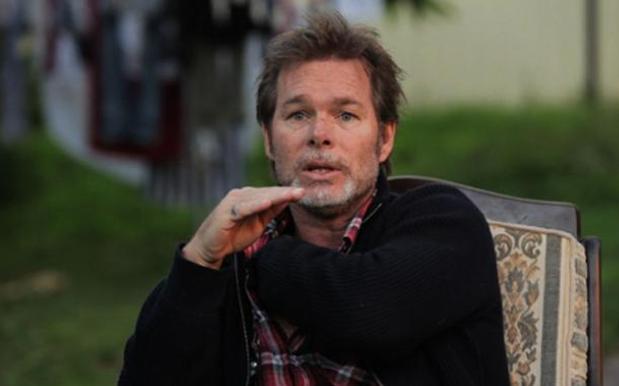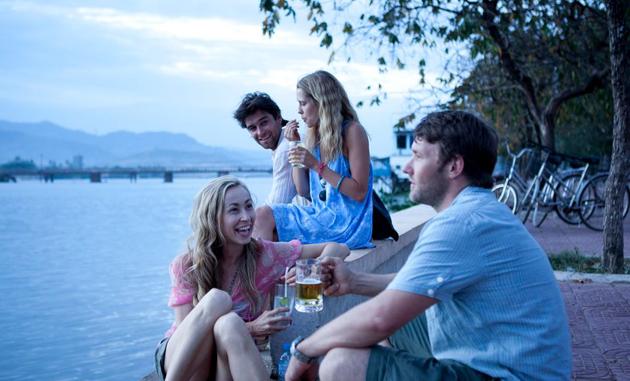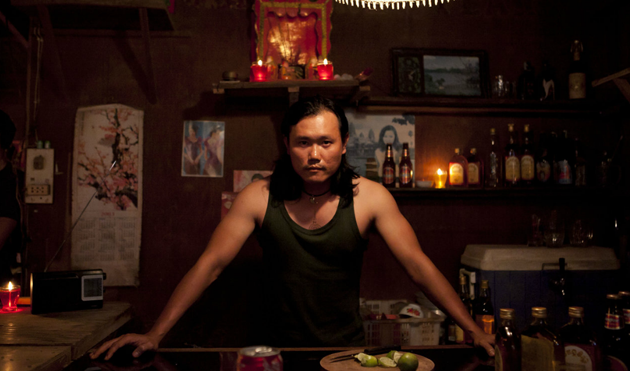
Can you talk us through the curation process for the Homebake Cinema Pavilion? It’s pretty different to a traditional awards-based film festival. It’s basically a chill out area or somewhere for people to get away from the weather and the noise at Homebake. A place to wind down and be entertained by some good local filmmaking. It started ten years ago through Joe Segreto, one of the promoters who I got to know through the music industry and making clips for bands and following a bunch of bands around documenting their work, he liked what we were doing at Blue Tongue Films and he asked if we wanted to put together a tent with some short films to play at the festival to give people an extra space. So it started out pretty small but since then I’ve really taken it on board as a great opportunity to highlight the depth and diversity of the talent we have out there. Homebake itself is an all-locals event obviously so I just try to keep my ear to the ground and locate the local films that have been doing really well at festivals and getting good audience responses so I can get those filmmakers in front of as big an audience as possible. Homebake provides a huge audience throughout the day so we run the films on a loop and they’ll play a few times throughout the day and it gives everyone a chance to see them. It’s really about drawing attention to what people are doing out there. It’s a bit of a cottage industry and I think the more people aware of your work the better.
What’s the one film that people shouldn’t miss? There’s actually a few films from previous years that I’ve repeated because people always respond to them. One of them is a film called Cicada by Amiel Courtin-Wilson, he’s a Melbourne filmmaker and his first feature length drama, Hail, recently premiered at the Venice Film Festival. He also made a feature length documentary called Bastardy which was incredible. I just think he’s a remarkable filmmaker, very unique, very personal, very brave and his film Cicada is pretty extraordinary.
I think Bastardy is one of the best Australian docos ever made…The guy is just amazing. He’s brave, he’s patient, he’s unique. He’s got a lot of things to say for all the right reasons. What else? There’s another film that’s quite commercial in its aesthetics, approach and presentation but I think it really illuminates a great potential feature film director. It’s called Glenn Owen Dodds by a guy called Frazer Bailey who’s up in Queensland and it’s won a lot of awards all over the place but I just think the guy has a really good handle on his audience. It’s quite, I guess, populist and clean for lack of a better word but it’s just really well handled. It’s a sign of a really mature and capable director so I think that’s worth seeing.
How have you seen Australian film change over the last ten years since you’ve been curating this? It kind of just changes with the global climate. Filmmaking like all art is ever-evolving and as approaches to scriptwriting and storytelling become more diverse and challenging, audiences have become far more educated than they were 10 or 15 years ago. In terms of Australia, it’s really hard for me to say. I just think that some years some fantastic scripts come through and some fantastic films get made and other years not. It just depends on who happens to come up with a great idea, where they are in their career, and whether or not they’re able to realise it. I think we’re in really good shape. I’m really proud of what’s been happening the last few years in particular. It’s really strong and there’s a lot of filmmaking teams out there at the moment – producer, director and writer teams – who are coming up with world class productions and ideas. I know that overseas the Australian film industry is perceived incredibly well. In America and Europe there’s talk of this Australian New Wave and I don’t know how true that is but we’re in good shape and I hope it maintains for a while.
You mention this perceived Australian New Wave. And it’s interesting because two of the filmmakers you have chosen, David Michod and Warwick Thornton, won awards at Cannes and Sundance and have attracted critical acclaim overseas. Does it feel like a turning point for people in the Australian film industry? Look, I think so. A friend of mine Brendan Fletcher, who directed Mad Bastards which was at Sundance last year, said that the whole festival seemed to be talking about Australian films and indeed the festival organisers mentioned something about the Australian New Wave. And I feel like there’s been a shift away from what you might call hokey Australian filmmaking. The material is more interesting, there’s more mature projects coming through, more world class scripts. I have a film coming out next year and I feel like it’s coming out at the exact right time. You know, people are really aware of what we’re doing at Blue Tongue on account of not only Animal Kingdom and The Square but Luke Doolan’s film Miracle Fish getting an Oscar nomination but there’s a huge body of short films that have been doing the rounds on the internet for years and people have been keeping an eye on us. To be part of that collective and part of this perceived Australian New Wave is a real bonus for me and my film.
How long has Wish You Were Here existed in your mind? Well, my wife Felicity Price who co-wrote the script with me initially came up with the idea and that was in early 2007. So it took about four years to write the script which is pretty quick by general standards from the first time the pen touches the page to turning on a camera. It was actually quite a quick process. What is that? About four and a half years to make the film. I’ve been in development on other projects that haven’t actually been made where I’ve been in script development for seven years. It’s been really quite speedy and positive all the way through. We’ve had incredible support from the agencies here and it feels like all the stars have aligned nothing’s gone wrong yet.
Touch wood. You’ve been making shorts and been involved in shorts for years why do you think it took so long to make your first feature-length film? Was it just that financial barrier? Yes and no. I mean, you have to get money to make a film but you can only make it if you have a good script. You have to do the laps and learn to write and that takes a long time because it’s a difficult thing to write a screenplay. More importantly, you have to come up with the right idea. One of the scripts I wrote before this is actually going to be our next film and that certainly wasn’t wasted time but it was the wrong budget and the wrong film for my first film. Coming up with an idea for you first feature is a really difficult thing. It’s got to be achievable on a low budget, it’s got to be effective and something that’s going to move and inspire audiences. It’s not an easy thing to write. The biggest obstacle and the thing that takes the longest time is actually finding the right idea. The one to get behind.
So thank God for your wife. Yeah, yeah. I owe her much.
 Wish You Were Here
Wish You Were Here
What was that process like, collaborating with someone who you share a life with. I know some people would find that quite challenging… It was all sorts of things. The best thing about it was rather than having two co-writers who’d meet up in an office each day and work and then go home at night, we were at home all day, all the time, and at night. We have two little toddlers so we had our hands full but the whole time we were working whether that be going for a walk or washing dishes or lying in bed late at night. Anything we were doing, if an idea came or we worked out something about the story we’d just spitball it. So it was a very fluid and ongoing process. I recommend it to anyone, if you can do it it’s a fantastic way to keep a script alive and chip away at it. It was very successful for us and I’d do it again in a heartbeat if we got the right idea to work with again.
That’s really encouraging. It was good. I loved it. The other good thing was she ended up playing one of the lead roles opposite Joel Edgerton and we always knew that we were writing that role for her. It meant that by the time we were shooting, having written it with me, she was all over it. She knew everything behind the character, every single thought that went into every decision and every motivation for every line of dialogue she spoke. It was wonderful.
Can you describe the shooting process? You guys shot in Cambodia for a bit which would have been interesting… Yeah, we mainly shot in Sydney but we spent a couple of weeks in Cambodia which was just wild. That’s a whole other story. It would take me forever to tell you all the crazy things that happened over there. I think we shot four and half weeks in Sydney and two weeks over there. It’s all shot on location so there’s no studios or sets or anything like that. It’s a low budget film, around $2.5m, and one of the most important things for me was finding the right locations. Locations that were easy to shoot and possessed the right kind of aesthetic and lighting and qualities that I was looking for. I also really wanted a fresh take on Sydney, I wanted to shoot the Sydney that I knew. In the end I think it’s a really fresh approach and not like any other Sydney based films I’ve seen. It feels more international in a way.
Can you brush over some of the challenges you faced in Cambodia? (Laughs) Just a couple off the top of my head…I fell into a sewer up to my neck on day one. That got me off to a good start. It was also a challenge because I was over there with my wife in the lead role, a two and half year old and a five month old who we couldn’t leave at home so we had both of them over there with a nanny. They were all sharing a small hotel room and Felicity and I were doing the same. One night I remember we had been shooting for twelve hours or something and I finally got back to the hotel room to sleep and I heard this scream and my little boy had fallen out of his bed and landed on his face on the concrete hotel floor and smashed his teeth out. That wasn’t good either. My wife and I both had dysentery and the flu. You know, it was full on. So it was difficult but you’re so full of adrenalin you get through it and still manage to have a good time. But also we were shooting in some pretty crazy areas. I can’t really give away the settings because it’ll give away parts of the story but when you see the film it’s the real deal, put it that way. We’re in some of the sketchiest parts of the country so there was that element of danger. Also, it’s a small industry over there so it’s hard to get good gear and the crews don’t speak English, I was directing Vietnamese and Cambodian actors who didn’t speak a word of English so we had to go through translators. Just challenging in every single way but the material we got out of it was awesome and I’m so excited by that whole component of the film.
 Wish You Were Here
Wish You Were Here
I interviewed your colleague David Michod last year and I asked him how he handled jumping from shorts to features and he said that literally nothing can prepare you for it and he was smoking like two packets of cigarettes a day. Was that jump as nerve racking for you coming into your first feature? Look I have to say and I don’t want to come off sounding the wrong way but I found the whole process easier than I expected. I really enjoyed it. I’m a relatively anxious type generally but when I’m under extreme pressure like that, something happens to me and I tend to calm down and get a lot more focused and it tends to make things easier for me. So I actually thrived on the pressure. Maybe it’s a bit like giving a hyperactive kid Ritalin, it calms them down. I really enjoyed that high stakes, gun to the head decision making. I just hope to keep doing it for the rest of my life because it’s a really buzzy experience. Having said that it was enormous pressure. I suppose the good thing is I had two tiny kids at home that I had to deal with so I had my hands full at home as well. There was so much going on I didn’t have a chance to stop and think, I just had to keep going, kind of like being at war or something (laughs). I have to say at the end of it, even though I probably developed lung cancer and I was drinking too much, I expected to come out of there with a complete nervous breakdown but if anything I came out of there feeling really energised and happy.
The synopsis for the film is quite vague, was that part of the plan for this film, for people to come into it blind? Yeah, absolutely. There’s a mystery-thriller component to the film which is very important and key to its success for audiences, I think. They’re tricky synopses and trailers and whatnot because you don’t want to let the cat out of the bag. It’s hard to write that stuff…
Finally, what do you have in store for next year and beyond?We’re making this next movie which is the script I wrote before this one and we’re just in the process of setting that up. It’s just one day at a time really. I’m just dying for Wish You Were Here to come out and for people to see it because I’m really proud of it.
Kieran thank you so much for your time. Cheers mate.
HOMEBAKE 2011 – The Classic Edition
Featuring the Homebake Cinema Pavilion, curated by Kieran Darcy Smith and Blue Tongue Films.
Saturday December 3rd, 2011. The Domain, Royal Botanic Garden, Sydney City, NSW.



